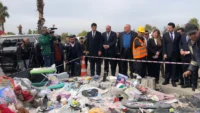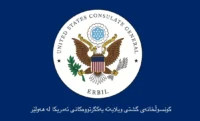
Targeting local business figures
Two years on from first Erbil missile attacks, Iranian claims remain unsubstantiated
ERBIL — Late on the night of March 13, 2022, Erbil was jolted by powerful explosions, marking an unprecedented escalation in the city. The sounds of the blasts left residents in a state of confusion.
This event was the first time Erbil faced an Iranian ballistic missile attack.
The Kurdistan Region’s Directorate General of Counter-Terrorism reported that 12 ballistic missiles had been fired from Iran, targeting Erbil.
Following the attack, Iran’s Islamic Revolutionary Guard Corps asserted responsibility, claiming they aimed at “the center of Zionist conspiracy and aggression.” However, the missiles actually hit civilian areas, particularly impacting the residence of Baz Karim Barzinji – locally known as Sheikh Baz – a prominent businessperson in the Kurdistan Region’s energy sector, along the Erbil-Pirmam road.
Daylight revealed the full extent of the devastation, with a large villa severely damaged by the strike. The damage was so extensive that survival without injury for anyone inside would have seemed miraculous.
In a twist of fate, Baz Karim and his family had decided, merely hours before the attack, not to stay in their villa that night, a decision that unknowingly spared their lives.
The Kurdistan Regional Government quickly refuted Iran’s justification for the attack, emphasizing that the targeted site was a civilian area. “The pretext is merely an attempt to justify this atrocious act, with the attackers’ propaganda being far from reality. Iran has a history of such aggression,” the KRG stated.
Baz Karim, surveying the wreckage alongside senior officials from Baghdad, expressed his sorrow: “They have obliterated my family’s memories and all our archival records.”
Following the incident, Baghdad acted swiftly, with then-Prime Minister Mustafa Kazimi visiting the devastated site and establishing an investigative committee. This committee, after completing its inquiry in Erbil, found no evidence to suggest that Barzinji’s home, which was hit, had been used for any political or military purposes.
A security official from Baghdad, closely involved with the investigation into the Iranian missile strike, spoke to 964media under the condition of anonymity. The official revealed that although Tehran has been provided with the findings of the Iraqi probe, Iraq has still not received any substantiating evidence from Iran for the claims made by the Revolutionary Guard to justify the attack, despite the significant passage of time.
“Recent intensified security consultations with Tehran through joint committees between the two countries focused on the ballistic missile strikes claimed by the Iranian Revolutionary Guard. These strikes include the operation on March 13, 2022, targeting businessman Baz Karim, and the operation that resulted in the death of businessman Peshraw Dizayee,” the source noted.
“Two full years have passed since the first operation, with Iran failing to provide any proof despite repeated requests from Iraqi official bodies during various security meetings between the two sides.”
According to the source, “related authorities in Iran recently received a comprehensive file containing the results of Iraqi investigations from various entities, notably the report of the parliamentary committee chaired by Hakim al-Zamili, which heard testimonies from senior security officials, including a representative of the Iraqi National Intelligence Service. The representative acknowledged signs of Israeli espionage activities in central Iraq or Mosul but denied finding any evidence of Mossad headquarters in Erbil.”
Despite claims by Iranian media and official statements from Tehran of having “detailed evidence” and identifying alleged Mossad officers eliminated in the March attack, the Iraqi government source confirms that Baghdad has still not received any concrete evidence to back these assertions, two years post-incident.
Nearly two years on from the initial incident, on Jan. 15, 2024, another missile attack from Iran targeted Erbil under a similar pretext. This assault struck the home of prominent businessman Peshraw Dizayee. In contrast to Baz Karim, Dizayee’s family faced devastating losses: both he and his daughter were killed, his two sons and wife, Hana Jutiar, were injured, and businessman Karam Mikhail, who was visiting, also died. Additionally, a Filipina worker employed by the Dizayee family was confirmed dead by the honorary Philippines consulate in Erbil today, having been missing and presumed dead since January.
Iran offered the same justification for this attack, a rationale previously dismissed by both the KRG and Baghdad. It even went as far as to share doctored images of Dizayee supposedly with Israeli military and religious figures, photos that were debunked within hours by local journalists.
In political and diplomatic circles, there’s speculation that Tehran’s operations aim to systematically target the Kurdistan Region’s business community, especially those involved in key infrastructure and energy sector projects.
The fact that high-profile civilian residences were knowingly targeted indicates an effort to unsettle the region.

Erbil: Iraqi parliamentary delegation visits the site of the Iranian missile attack

Masoud Barzani: No pride or honor in killing women and children

Reactions to the IRGC missile attack on Erbil

Iraq's multifaceted response to Iran's missile strike in Erbil

Masoud Barzani dismisses Iran's 'Mossad' accusations

U.S. Consulate in Erbil: No American facilities were damaged by the Iranian attack




